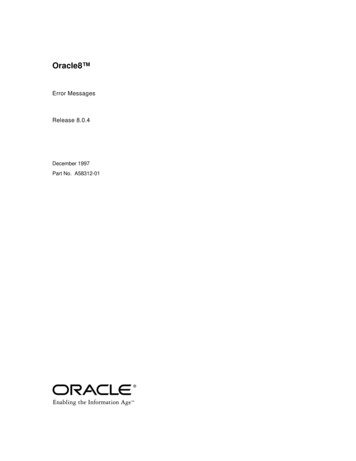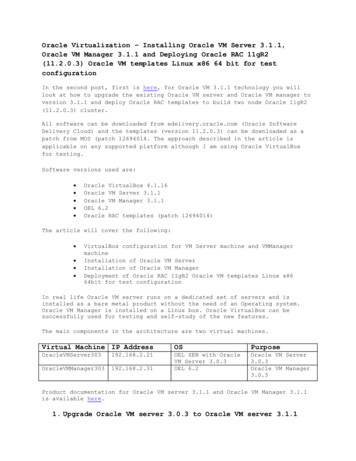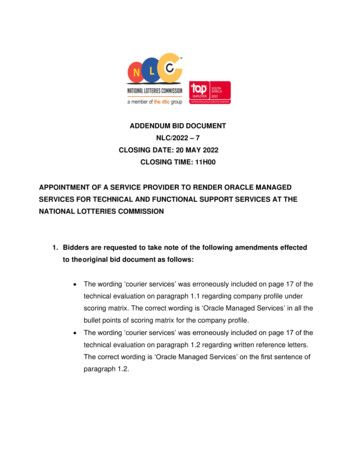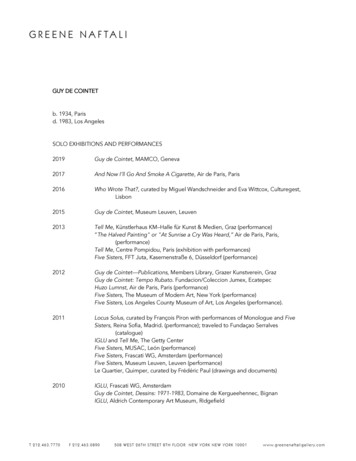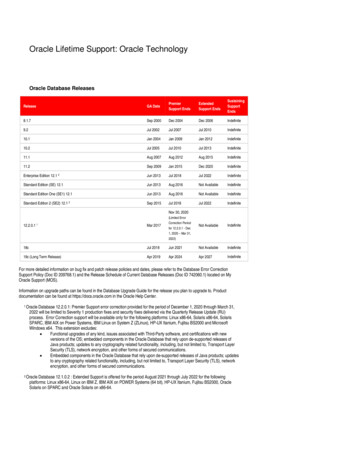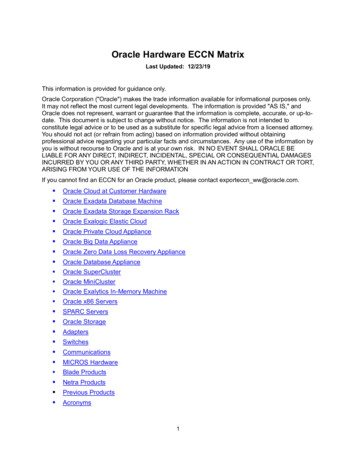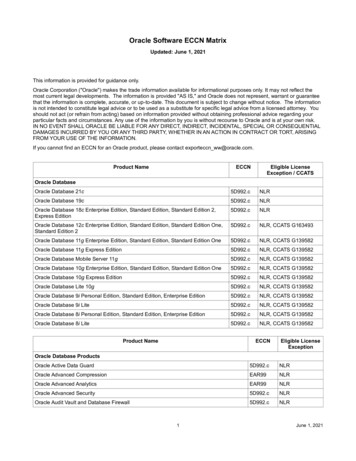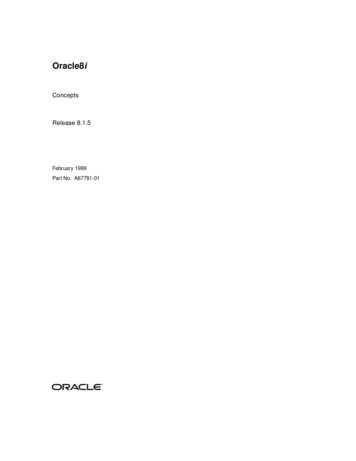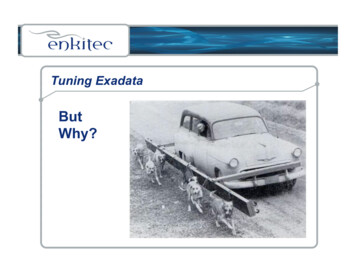
Transcription
Tuning ExadataButWhy?
whoami –Work for Enkitec (www.enkitec.com)Working with Exadata since early 2010Many Exadata customers and POCsMany Exadata Presentations (some to Oracle)Working on Exadata Book(kerryosborne.oracle-guy.com)
whoami – (my prejudices)I am an Exadata Fan Boy– so please take everything I say with a grain of salt
AgendaExadata BasicsOffloading- Optimizations- Requirements- How to tell if it’s working ***this is very important***DemoNew Way of ThinkingQuestions
Exadata BasicsExadata Storage ServersExadata Database Servers11gR2 / ASMiDB / RDScellsrv
The Big Ah Ha!The Bottleneck on Many (Most) LargeDatabases is between the Disk and theDB Server(s)!How to Speed Up?Make the Pipe Bigger/FasterReduce the Volume* The fast way to do anything is not to do it Cary Millsap
Offloading – The “Secret Sauce”Offloading vs. Smart Scan(what’s the difference)Offloading – generic term meaning doingwork at the storage layer instead of at thedatabase layerSmart Scan – query optimizations coveredby “cell smart table/index scan” wait events
Smart Scan OptimizationsColumn ProjectionPredicate FilteringStorage IndexesSimple JoinsFunction OffloadingVirtual Column EvaluationHCC DecompressionDecryption
How to Tune an Exadata (but not a fish)Check to see if you’re gettingSmart Scans!If you’re not, figure out whyand correct the situation!It’s Pretty Simple.3 things you’ll need to know: the Optimizationsthe Requirementshow to Measure
Smart Scan RequirementsFull ScanDirect Path ReadObject Stored On Exadata StorageWhy?Very Simple Explanation:Various full scan functions()- kcbldrget() – direct path read function- kcfis read() – kernel file intelligent storage read (Smart Scan)*why it’s there: checkpointing and non-block data return
Requirement 1: Full Scans TablePartitionMaterialized ViewIndex (FAST FULL SCAN Only)SYS@shareprd1 @op event awr.sql!Enter value for event: cell ------ ---------------------------------------- ----------!cell smart index scanINDEX STORAGE FAST FULL SCAN124!INDEX STORAGE SAMPLE FAST FULL SCAN234!cell smart table scanMAT VIEW ACCESS STORAGE FULLTABLE ACCESS STORAGE FULL* Query from DBA HIST ACTIVE SESS HISTORY1!27747!
Digression - New Exadata Wait Eventscell list of blocks physical readcell multiblock physical readcell single block physical readcell smart file creationcell smart incremental backupcell smart index scancell smart restore from backupcell smart table scan* Note that there are others, these are the most interesting
Requirement 2: Direct Path ReadsBypass buffer cache – direct to PGADecision not part of optimizer’s jobTraditionally Used by Parallel SlavesNon-Parallel Also Possible- Serial Direct Path Reads (adaptive)- algorithm not documented (but more aggressive in 11g) *- size of segment (table or index or partition)- size of buffer cache- number blocks already in buffer cache- small table threshold- very large table threshold* See MOS Note: 50415.1 - WAITEVENT: "direct path read" Reference Note
Requirement 3: Exadata StorageKind of Goes Without Saying Possible to have non-Exadata storage or mixedASM Diskgroup has an attribute: cell.smart scan capableMust be set to TRUE for Smart Scans to workCan’t add non-Exadata storage without changing to FALSE
How to Tell if You got a Smart ScanMillsap It!– (10046 trace)– most fool proofWolfgang It!– unfortunately this doesn’t work– 10053 trace (and the optimizer) has no ideaTP It!– Tanel’s snapper– v sesstat, v session event– great if it’s happening nowKO It!– My fsx.sql script– V SQL family of views: IO CELL OFFLOAD ELIGIBLE BYTES– dbms sqltune.report sql monitor works also– saved in AWR so works on historical data as well
How to Tell if You got a Smart Scan-- fsx.sqlselect sql id,decode(IO CELL OFFLOAD ELIGIBLE BYTES,0,’No’,’Yes’) Offloaded,decode(IO CELL OFFLOAD ELIGIBLE BYTES,0,0,100*(IO CELL OFFLOAD ELIGIBLE BYTESIO INTERCONNECT BYTES)/IO CELL OFFLOAD ELIGIBLE BYTES) "IO SAVED %”from v sqlwhere sql text like ‘&sql text’;* Warning: there are occasions where it’s not accurate
The Wrong Tool for the Job?Maybe:Any of the tools can do thejob. Just depends on thecircumstance and you’repreferences.
Demo Time
A New Way of Thinking
Smart Scans Are KeyNeed to be able to tell whether they are being usedNeed to be able to tell what optimizations are in playNeed to know what disables them
Other Smart Scan DisablersIOTsClustered TablesRowdependencies EnabledLOBsNo Direct Path Reads ** Note: You can get direct reads and still not get Smart Scan
Direct Reads?Gotta Have Em!How do we get Em?PX– not really as easy to control as you might thinkSerial Direct Read / Adaptive Direct Read– Algorithm is complicated– Works on Indexes as well by the way
Serial Direct ReadsCommon Reasons Not to Get Them: Big SGASmall TablePartitioning – decision based on segment sizeIndexes – generally relatively smallWorkarounds: PX DEGREE 2 PARALLEL DEGREE POLICY AUTO Scary “ serial direct read” always (not OPT PARAM compatible)
How Do It Know?The Optimizer Doesn’t KnowAbout Smart ScansClues:The cost calculations are the same10053 trace file shows nothingDecision to do direct path readis not part of optimizer- and code for Smart Scan is below kcbldrResults:When indexes are present, Exadata databases tend to over use them
To Index or Not to Index?Myth: Exadata doesn’t need any indexesTruth: You’ll need indexes for single row access (OLTP)Note: Moving to Exadata will allow you to get ridof a bunch of indexes that you weren’t usingin the first place.Note2: Moving to Exadata may make many indexesthat are being used unnecessary.* Hint: Make them invisible first, and then remove them!
Partitioning? Is Still Your Friend!It’s all about eliminating work (time):Storage Indexes can further reduce this, or in some instances beused instead of Partition Elimination.But you should not consider them a replacement for Partitioning.Partitions Also Provide Manageability:Partitions can have different storage characteristics (HCC)Don’t forget that Serial Direct Read looks at Partition Size
Parallel?There are many new features in 11gR2: Auto DOP Parallel Queuing In-Memory ParallelThese are not specific to Exadata.PX will be important in Exadata (uses Direct Path Read)Every query is parallelized across multiple storage cellsMay mean you don’t need as high DOPAuto DOP is probably the wave of the future but still scary
Nulls?Can’t be indexed via B-TreeCan’t do Partition EliminationBut they can be located with Storage Indexes*We may want to re-think the use of nulls*
Compression (HCC)Don’t even think about compressing active data Every change migrates the affected row to anew block (OLTP) Every change locks the entire CompressionUnit Partition large objects by time andcompress inactive partitions
Mixed Workload SystemsFlash Cache is Key Expect 1-2ms Single Block Reads If Not Getting Them, Check for FC Problems Consider setting CELL FLASH CACHE to KEEP Remember Indexes Can Be Overused(optimizer index cost adj)
Last ThoughtsTake Some Time to Test Just Because You Can Slam it in Doesn’t Mean You ShouldTake Some Time to Understand the Exadata Optimizations Know What to ExpectTake Some Time to Evaluate Indexes Migration is a Golden Opportunity to Get Rid of Some Make Sure the Ones You Keep Aren’t Overused
Exadata Job PostingRequirements* Previous consulting experience is preferred* Full life-cycle implementation experience* Candidates should have 10 years of Oracle Exadata experience* Candidates should be willing to travel up to 80-100%* Minimum Bachelors degree preferred* Citizens/GC/EADs are allowed --- No H1b
Questions / Contact InformationQuestions?Contact Information : Kerry e-guy.comwww.enkitec.com
Requirement 3: Exadata Storage Kind of Goes Without Saying Possible to have non-Exadata storage or mixed ASM Diskgroup has an attribute: cell.smart_scan_capable Must be set to TRUE for Smart Scans to work Can't add non-Exadata storage without changing to FALSE

